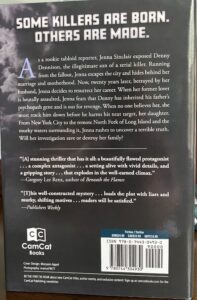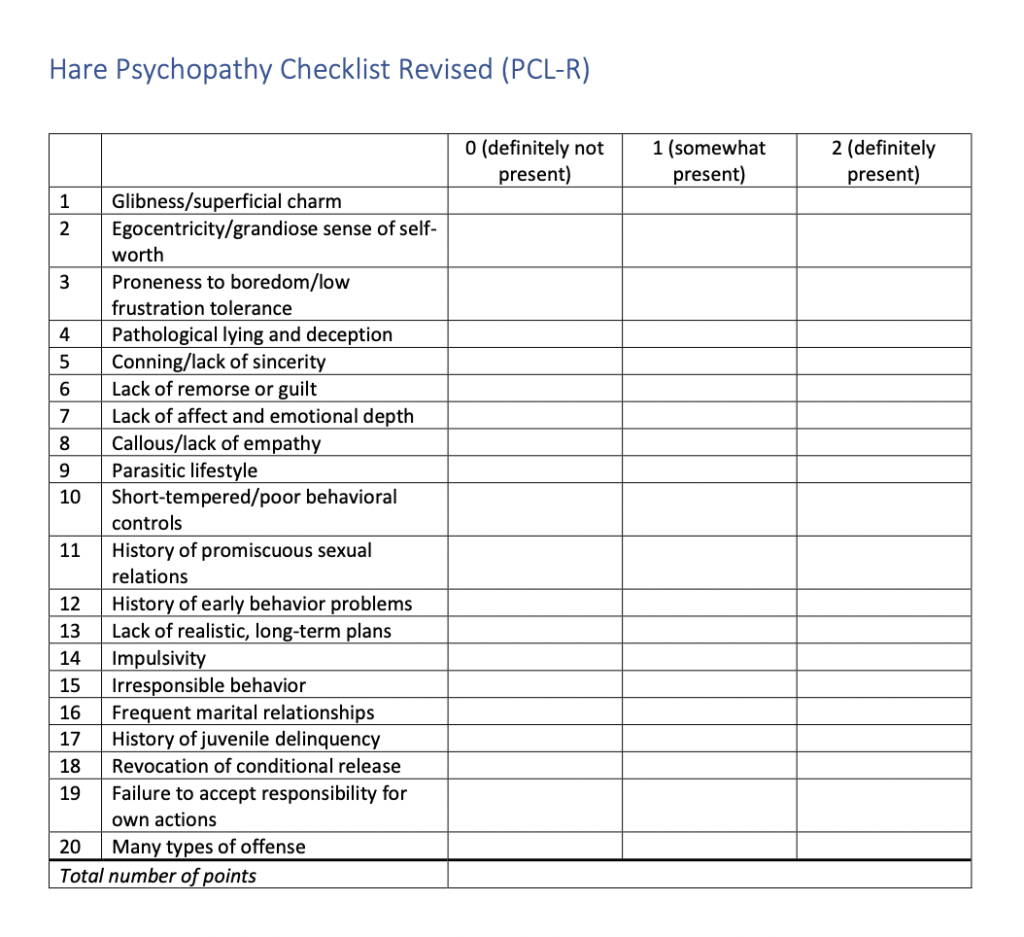I was clearing out some of my old files recently and found a big, fat one. It was labelled Fool Her Once/research. In it, I found pages of notes on the topic of a serial killer/psycho gene. Can a person be born with evil genes, I’d wanted to know. Is there such a thing as a bad seed?
 It’s the key premise of my thriller, Fool Her Once. It’s the book’s back cover tagline: Some Killers Are Born. Others Are Made. It’s what drives my main character, investigative reporter, Jenna Sinclair, to track down Denny Dennison, the man whose life she ruined when she exposed him as the secret son of a sadistic serial killer. After her former lover is brutally assaulted, she fears Denny has inherited his father’s serial killer gene, and is coming after her and her daughter next. When no-one believes her, she knows she needs to find him to stop him.
It’s the key premise of my thriller, Fool Her Once. It’s the book’s back cover tagline: Some Killers Are Born. Others Are Made. It’s what drives my main character, investigative reporter, Jenna Sinclair, to track down Denny Dennison, the man whose life she ruined when she exposed him as the secret son of a sadistic serial killer. After her former lover is brutally assaulted, she fears Denny has inherited his father’s serial killer gene, and is coming after her and her daughter next. When no-one believes her, she knows she needs to find him to stop him.
But, is there really such a thing as an evil gene that can be passed down, like blue or brown eyes, by fathers or mothers or grandparents? Before I started outlining my novel, I wanted to make sure that science and/or medical research had, at least, acknowledged it might be a possibility. And, what about real-life serial killers who’d fathered children? Where were those children? Kids like my fictional Denny? How had they turned out?
Warrior Gene
 There was quite a bit of research to dig up on the subject. Accessing Google, my favorite “instant” research tool, I was gratified to find references to a “warrior” gene. It seemed there was a variant of the MAOA gene, which was linked to extremely aggressive and violent behavior. I read pages and pages on the subject.
There was quite a bit of research to dig up on the subject. Accessing Google, my favorite “instant” research tool, I was gratified to find references to a “warrior” gene. It seemed there was a variant of the MAOA gene, which was linked to extremely aggressive and violent behavior. I read pages and pages on the subject.
In his book, The Psychopath Inside, Jim Fallon, a neuroscientist at UC, Irvine has an extremely long, detailed and mostly unintelligible (to me) chapter about genes and chromosomes and DNA. It also refers to alleles and enzymes, and how the low-functioning MAOA -L gene is formed. Too much information, but no matter. I was on a roll.
I found more references to the “warrior”gene in other articles. A promising feature in Popular Science was titled, “Can Your Genes Make You Kill? The answer appeared to be yes when author Lois Parshley in 2016 unearthed the story of Bradley Waldroup who had shot his wife’s friend eight times, killing her, and then cut off her head.
Waldroup’s lawyers sent a sample of his blood to a Nashville molecular genetics lab where technicians found the low-functioning version of MAOA. The lawyers then managed to get jurors to rule out the death penalty for Waldroup by essentially arguing: his genes made him do it! Great, I thought. I could definitely work some of that info somewhere into my thriller.
But Wait!
 I continued to sift through the research I’d downloaded and found more information from Jim Fallon. Specifically, a transcript of an interview on NPR. As I scrolled through it, my eye alighted on a couple of sentences where Fallon was explaining that males could only inherit the deficient MAOA-L gene from their mothers. Something to do with the fact that MAOA is found on the X-chromosome which males only get from their mothers.
I continued to sift through the research I’d downloaded and found more information from Jim Fallon. Specifically, a transcript of an interview on NPR. As I scrolled through it, my eye alighted on a couple of sentences where Fallon was explaining that males could only inherit the deficient MAOA-L gene from their mothers. Something to do with the fact that MAOA is found on the X-chromosome which males only get from their mothers.
What!?
Well, that somewhat spoiled my storyline of Denny inheriting his father’s killer gene. But all was not lost according to information I retrieved from a research paper written by Dr. Philip Hunter. He wrote it for the National Library of Medicine, the world’s largest biomedical library, run by our federal government.
In that paper, titled, The Psycho Gene, Dr. Hunter wrote: “While the idea of a ‘criminal gene’ is nonsense, there is growing evidence that some psychopathic behavior might indeed be grounded in genes.”
So, okay. But aren’t serial killers, psychopaths? It turns out that while mostly all serial killers are indeed psychopaths, not all psychopaths are serial killers or killers of any sort, or even criminals.
And, as I discovered, there is widespread agreement among medical professionals that psychopathy is heritable.
For example, based on a checklist of psychopathic behavioral traits (there are no genetic or clinical tests for psychopathy, yet) studies have been conducted on twins raised separately who nevertheless exhibit the same psychopathic traits. The results of this Minnesota Study of Twins Reared Apart, experts say, indicates there is a biological/genetic component to psychopathy — although usually environmental factors (like childhood abuse) need to be present to trigger real psychopathic behavior.
Who Is A Psychopath?
 So what are are these psychopathic behavioral traits? These days, the boilerplate checklist is one devised by acknowledged world expert Robert H. Hare, a Canadian forensic psychologist. His book, Without Conscience tells you everything you always wanted to know about psychopaths and their victims. On his list are traits such as lack of empathy or remorse or guilt; deceitfulness; pathological lying, that is, lying just for the sheer delight of duping a victim; manipulation, and the callous use and abuse of others (See chart below.)
So what are are these psychopathic behavioral traits? These days, the boilerplate checklist is one devised by acknowledged world expert Robert H. Hare, a Canadian forensic psychologist. His book, Without Conscience tells you everything you always wanted to know about psychopaths and their victims. On his list are traits such as lack of empathy or remorse or guilt; deceitfulness; pathological lying, that is, lying just for the sheer delight of duping a victim; manipulation, and the callous use and abuse of others (See chart below.)

According to Hare and other experts, there are more psychopaths walking among us than we might suspect. Some are very charming and likable. (See the top of the Hare chart (glibness/superficial charm.)) But they are also likely to be highly manipulative. They have learned how to “walk the walk and talk the talk” of normal people to get what they want. Hence, they become those first-class swindlers and fraudsters that we sometimes read about in the news, or watch documentaries about.
My Antagonist? Killer or Psychopath?
As for my thriller, I figured all my research meant that Denny Dennison could inherit a whole bunch of traits from his father that made him either a really bad guy determined to physically hurt Jenna, her daughter and others in Jenna’s life, or a devious, manipulative character out to destroy Jenna’s life in a much more insidious way.
Where Are The Children?
Towards the end of Fool Her Once, my main character, Jenna, meets an FBI agent. He runs a behavioral science unit tracking the children of known serial killers to determine if the children are exhibiting criminal tendencies. As I write in the Q&A section of my novel: “Like TV’s X-Files unit investigating paranormal events for the FBI, the behavioral science unit in Fool Her Once is a figment of my imagination. I think.”
What is definitely not fiction or a figment of my imagination is that real-life children of known serial killers actually exist. My research into these kids led to a number of surprises and interesting stories which I will blog about next time.
Goodreads Giveaway
If you’ve gotten all the way to the end of this blog, perhaps you’re interested enough to want to read Fool Her Once. So, forgive me for announcing that my thriller FHO is a Goodreads giveaway until March 4, 2023. My publisher is giving away 3 print copies of Fool Her Once.
Here is the link to the giveaway.

Otherwise, Fool Her Once is out in paperback next week.
One thought on “Is There A Serial Killer Gene? Here’s What I Learned While Researching My Thriller”
Comments are closed.